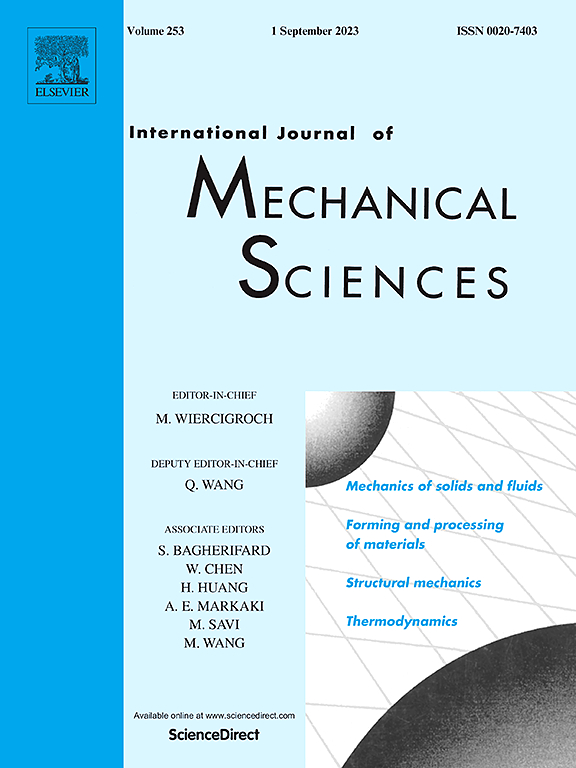Constitutive modeling of shear thickening fluid using continuum mechanics
IF 7.1
1区 工程技术
Q1 ENGINEERING, MECHANICAL
International Journal of Mechanical Sciences
Pub Date : 2025-02-20
DOI:10.1016/j.ijmecsci.2025.110057
引用次数: 0
Abstract
Shear thickening fluid (STF) exhibits intelligent rheological properties associated with its strain rates, demonstrating excellent viscosity thickening and thinning effects. These properties effectively enhance the performance of STF utilized in impact protection. However, the thickening effect has posed significant difficulties in the theoretical study of STF, resulting in a lack of specific constitutive models and experimental verification. To address this issue, we perform systematic rheological tests across a wide range of loading rates, thoroughly exploring the intelligent rheological responses of STF. Based on the mechanical behavior, we utilize an innovative approach for STF to develop a novel shear-thickening constitutive model within a framework of continuum mechanics, contributing to its theoretical understanding and providing guidance for applications. Given the nonlinearity of the constitutive equations, we present a corresponding numerical implementation approach to efficiently obtain solutions, and subsequently conduct parameter identification using this approach. The significant overlap between the experimental results and model predictions indicates that the new model accurately captures the intelligent rheological behaviors of STF. Furthermore, we design a series of simulations as anti-impact application scenarios of the STF-based composite, which activates a viscosity thickening effect to deliver strong resistance during high-speed impacts. Interestingly, unlike constant-viscosity materials, the STF-based composite exhibits a unique thinning effect and consumes very little energy during low-speed impacts. Consequently, when used as wearable equipment, it not only effectively weakens high-speed impacts, but also facilitates unrestricted movement during low-speed activities. These findings offer valuable guidance for the designs and applications of STF-based products.

求助全文
约1分钟内获得全文
求助全文
来源期刊

International Journal of Mechanical Sciences
工程技术-工程:机械
CiteScore
12.80
自引率
17.80%
发文量
769
审稿时长
19 days
期刊介绍:
The International Journal of Mechanical Sciences (IJMS) serves as a global platform for the publication and dissemination of original research that contributes to a deeper scientific understanding of the fundamental disciplines within mechanical, civil, and material engineering.
The primary focus of IJMS is to showcase innovative and ground-breaking work that utilizes analytical and computational modeling techniques, such as Finite Element Method (FEM), Boundary Element Method (BEM), and mesh-free methods, among others. These modeling methods are applied to diverse fields including rigid-body mechanics (e.g., dynamics, vibration, stability), structural mechanics, metal forming, advanced materials (e.g., metals, composites, cellular, smart) behavior and applications, impact mechanics, strain localization, and other nonlinear effects (e.g., large deflections, plasticity, fracture).
Additionally, IJMS covers the realms of fluid mechanics (both external and internal flows), tribology, thermodynamics, and materials processing. These subjects collectively form the core of the journal's content.
In summary, IJMS provides a prestigious platform for researchers to present their original contributions, shedding light on analytical and computational modeling methods in various areas of mechanical engineering, as well as exploring the behavior and application of advanced materials, fluid mechanics, thermodynamics, and materials processing.
 求助内容:
求助内容: 应助结果提醒方式:
应助结果提醒方式:


